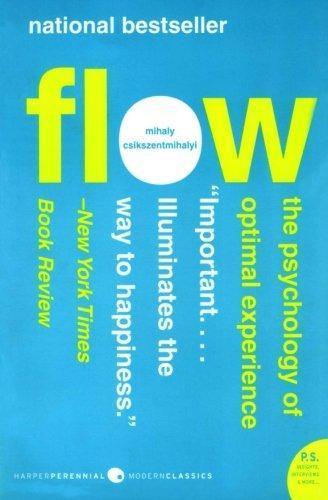Flow is Slow But a Classic Just the Same
4 stars
The well known psychological state of Flow was essentially defined by this famous book. Flow occurs when one is singularly focused on a challenging task where time seems distorted, distractions seem diminished, and one's sense of well being is high. Although this state is usually achieved spontaneously, and most of us have experienced it at least occasionally, it has been extensively studied and the factors that induce it are known. If one understands these factors, then entering a flow state on demand is possible.
In order to achieve a flow state, one must learn how to focus attention on the task at hand and reduce distractions. The task, whether it's physical or mental, must be challenging with clear goals or outcomes. One must approach these tasks with genuine interest or curiosity, otherwise, the motivations will not allow for a flow state to develop. For example, if you're researching a topic because you want to win a debate or showcase your brilliance in a social group, you're unlikely to experience flow because the motivation is extrinsic. However, if you're researching a topic to satisfy your intrinsic curiosity, then a flow state is possible.
It seems to me that there's a lot of overlap between mindfulness or meditation and flow. Both require focused attention, openness to new experiences, and practice in order to achieve the desired state—a calm mind. A disordered mind is the opposite of a calm mind, which the author calls cognitive entropy. Several examples are provided where people have managed to achieve a flow state in the most mundane of circumstances, like the assembly line worker, the prisoner in solitary confinement, the lawn cutter. Each develops routines to fill in the boring parts. They'll focus on the tiniest of details or invent games to help them achieve a flow state pass the time in as enjoyable a manner as possible.
Ironically, I found the author's writing style a bit distracting, which prevented me from experiencing flow while reading this book, even though reading is one of the best flow-inducing activities. In his effort to provide relevant examples to help make his point, he lists off several relevant but arbitrary items to make the point. Here's a sample:
For a child, it could be placing with trembling fingers the last block on a tower she has built, higher than any she has built so far; for a swimmer, it could be trying to beat his own record; for a violinist, mastering an intricate musical passage. For each person, there are thousands of opportunities, challenges to expand ourselves.
It was the arbitrariness, I think, that I found most distracting. I also found that the latter half of the book was more about leading a fulfilling life rather than the flow experience itself. Although I appreciate the larger point he was trying to make—that flow experiences can be extended well beyond the immediate task at hand to life in general, especially as it relates to optimal performance—it still came off as a bit of a stretch from the familiar psychological state of flow. For me, a deeper discussion of the science behind the flow state would have been more useful.
Overall, there's no denying that this book is a classic. But I found it a bit "soggy in the middle," as some editors are wont to say—maybe even more so towards the end. I've read this book twice now just to convince myself that once was really enough.

